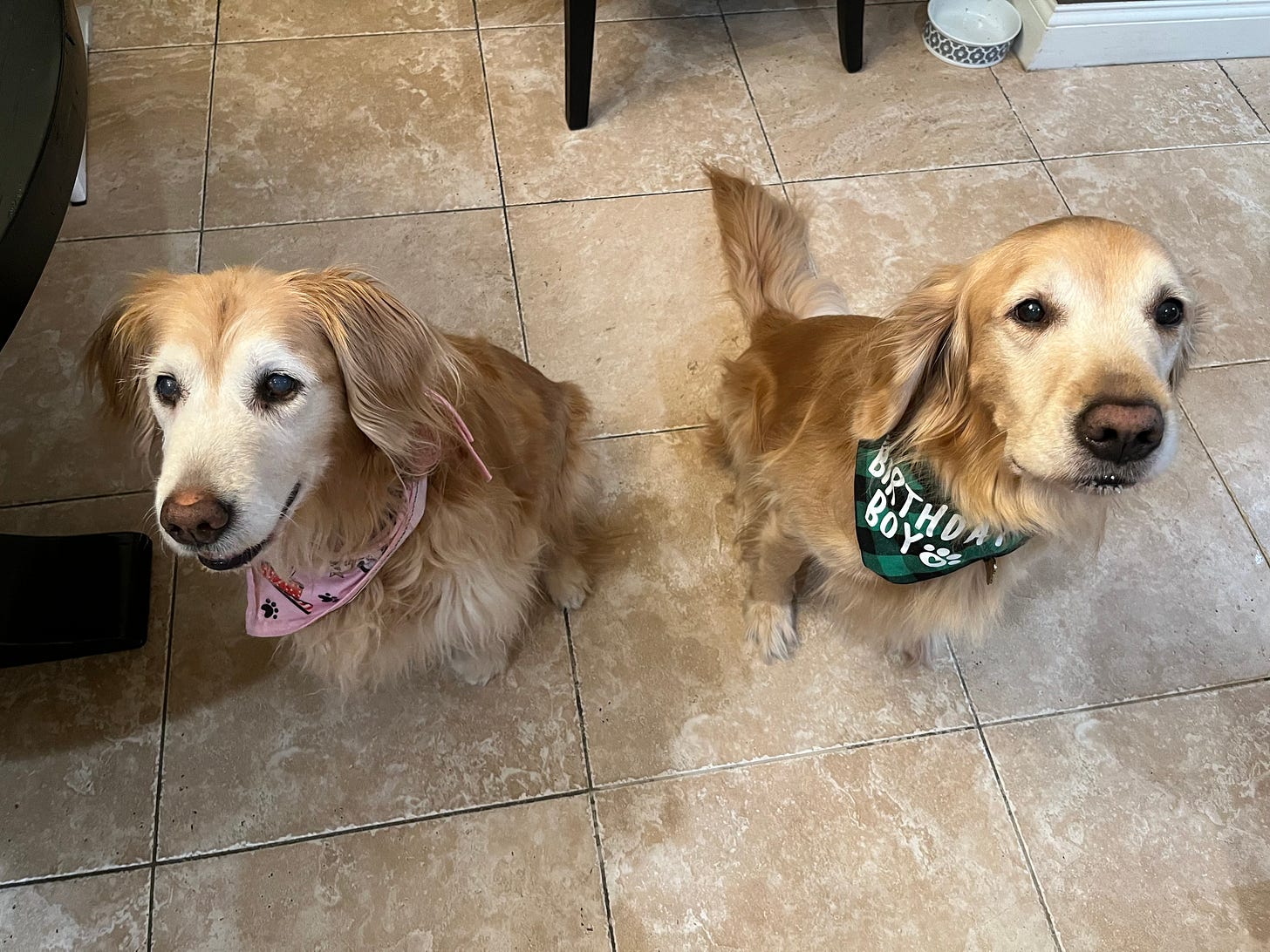Shining Light on Golden Retriever Pigmentary Uveitis
Volume 37: Get Your Golden's Eyes Checked by a Veterinary Opthalmologist TODAY!
Hello Golden Puppers!
In our ongoing effort to keep our community well-informed about the health of our beloved Goldens, this month's newsletter dives into an eye condition that has become increasingly important to understand: Golden Retriever Pigmentary Uveitis (GRPU).
We are particularly interested in this topic because The Golden Pupper’s very own goldens, Molly and Bentley, sadly have this progressive disease. Very few golden owners know about GRPU, what signs to look for, and do not know a veterinary opthalmologist exists for our furbabies to help prevent and treat it.
Understanding GRPU
Golden Retriever Pigmentary Uveitis, often abbreviated as GRPU, is a breed-specific eye disease that primarily affects Golden Retrievers. Recognized since the late 1990s, GRPU is an inflammatory condition of the eye characterized by the deposition of pigment on various parts of the eye, leading to potential complications like cataracts, glaucoma, and, in severe cases, blindness.
Symptoms to Watch For
Early detection is key with GRPU, but the symptoms can be subtle. Here are some signs to be vigilant about:
Redness in the eyes - This might be one of the first visible signs, though it can be intermittent.
Changes in eye color - Look for unusual pigmentation or color changes around the iris or on the lens.
Cysts in the eye - These might not be visible without specialized equipment but are a hallmark of GRPU.
Squinting or discomfort - If your Golden seems to be in pain or frequently squinting, it's worth a vet check.
Vision changes - Any signs of vision impairment should prompt an immediate veterinary visit. A common vision change sign would be your golden bumping into things in their environment.
Diagnosis and Treatment
Diagnosing GRPU requires an ophthalmologic exam by a Veterinary Opthalmologist (VO), often involving pupil dilation to check for characteristic signs like radial pigment on the lens. General practicing veterinarians are not trained in this area of the field and do not have the equipment to evaluate the eyes as a VO does. A Veterinary Opthalmologist has had additional specialized training in this area of the field.
Treatment aims at managing inflammation and preventing or delaying complications like glaucoma. Common treatments include:
Topical anti-inflammatory medications - To reduce inflammation.
Systemic treatments - In some cases, oral medications might be necessary.
Regular monitoring - Ongoing vet visits are crucial to adjust treatment and monitor progression.
The Genetic Aspect
GRPU is suspected to be hereditary, making responsible breeding practices vital. Breeders are encouraged to screen their dogs annually, even after retirement from breeding, to help prevent the spread of this condition. If a Golden is diagnosed with GRPU, breeding from that line should be ceased to avoid passing on the condition.
What Can Owners Do?
Annual eye exams: Regular check-ups by a veterinary ophthalmologist can catch GRPU early resulting in the best prognosis. Free eye exams conducted by a VO are offered at times such as with the Golden Retriever Club of America so be on the look out online for dates and info!
Educate yourself and others: Awareness is the first step in prevention and early treatment. If you or anyone you know has a golden, tell them about this disease and take their dog to a VO to be evaluated.
Support research: Organizations like the Golden Retriever Foundation and the American Kennel Club Canine Health Foundation are actively researching GRPU. Consider supporting these efforts or participating in studies if possible.
Dr. Wendy Townsend at Purdue University is a VO who has been dedicated to studying GRPU to determine its cause and treatment. You can inquire about current or future studies and aid in her efforts by contacting her through the following:
Department of Veterinary Clinical Sciences
Purdue University College of Veterinary Medicine
625 Harrison Street
West Lafayette, IN 47907765-494-1107
townsenw@purdue.edu
Community Support
Dealing with GRPU can be challenging. We stand ready to support each other. Sharing experiences, asking questions, or simply offering a listening ear can make a significant difference. If you have a Golden affected by GRPU or are seeking advice on managing the condition, please don't hesitate to reach out or comment below.
A great Facebook group to join is: Golden Retriever Pigmentary Uveitis. There you will find tons of information and support.
Conclusion
While GRPU presents a significant challenge, with early detection, diligent management, and community support, we can mitigate its impact on our Goldens' lives. Keep your eyes open, literally and figuratively, for the health of your furry friends. Stay vigilant, and let's continue to learn and grow together for the sake of our Golden Retrievers' health and happiness.
References:
Morris Animal Foundation on GRPU
AKC Canine Health Foundation's diagnostic criteria for GRPU
Purdue University's research on GRPU


